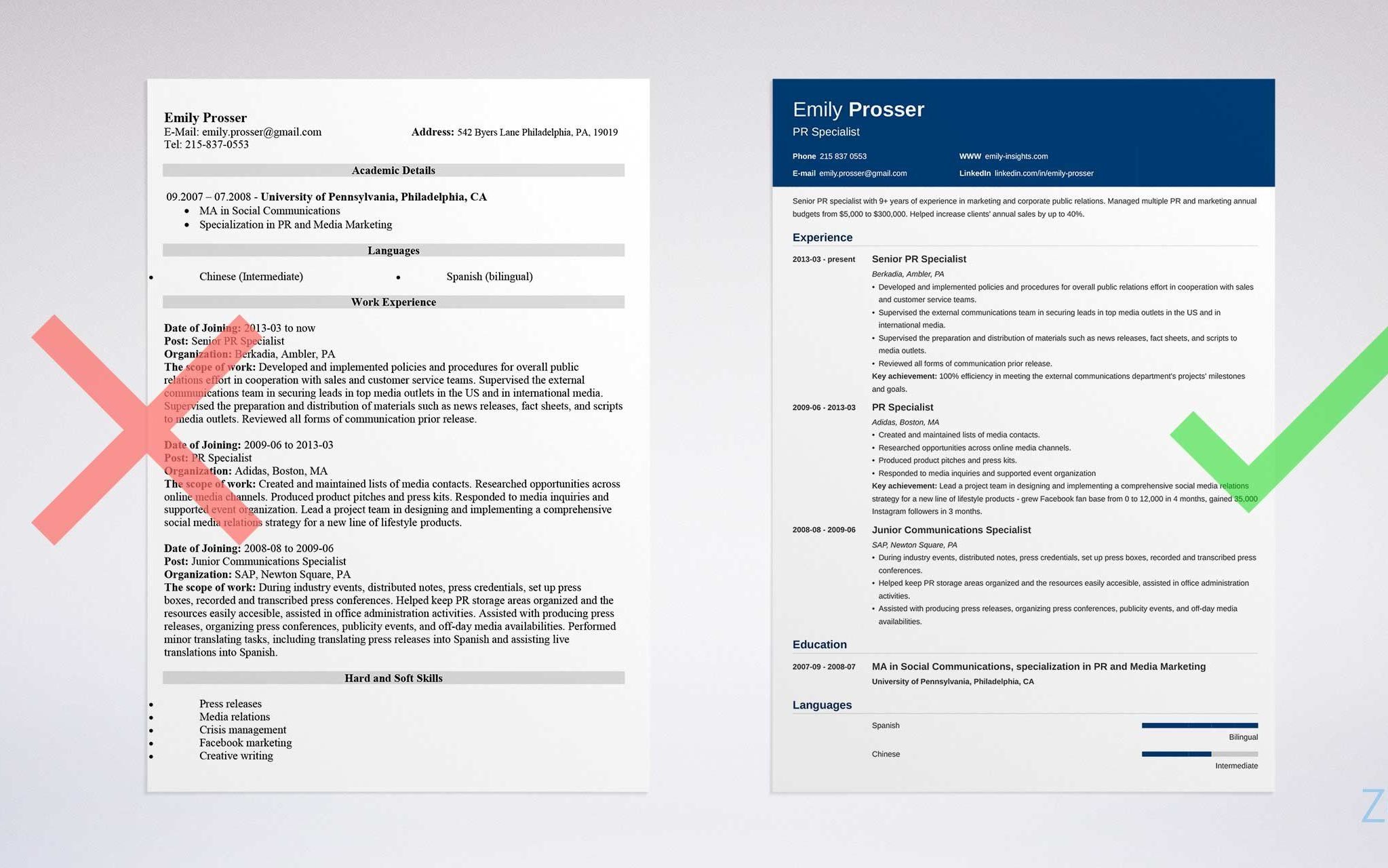Creating a well-crafted CV (Curriculum Vitae) is essential for making a strong first impression on potential employers. For college students and freshers, an online CV preparation process can simplify the…

Good Resume vs. Bad Resume – A Fresher’s Guide
Congratulations on graduating! Now comes the exciting (and sometimes daunting) task of landing your first professional role. Your resume is the frontline soldier in this battle, the first impression that grabs the attention of potential employers. But with so many applications flooding in, how do you make yours stand out?
The answer lies in crafting a powerful resume that showcases your skills and achievements, separating you from the crowd. This guide will equip you, the savvy fresher, with the knowledge to differentiate between a resume that gets you interviews and one that gets lost in the pile.
Good vs. Bad Resume – Key Differences
Think of your resume as a billboard. It needs to be clear, concise, and impactful within a short timeframe. Let’s break down the key elements that differentiate a good resume from a bad one:

Content
- Good: Tailor your resume to the specific job. Highlight skills and experiences directly relevant to the position you’re applying for. Use keywords from the job description throughout your resume.
- Bad: Generic and one-size-fits-all. Avoid generic descriptions and responsibilities unrelated to the job. Don’t overload with irrelevant skills or experiences.
Formatting
- Good: Easy to read and navigate. Use clear headings, bullet points, and consistent formatting. Maintain a professional font (e.g., Arial, Times New Roman) and readable font size (10-12 pt).
- Bad: Cluttered and hard to follow. Avoid fancy fonts, graphics, or excessive text blocks. Inconsistent formatting makes it difficult for Applicant Tracking Systems (ATS) to scan your resume.
Achievements
- Good: Quantifies accomplishments with numbers and data. Highlight specific achievements using metrics (e.g., Increased website traffic by 20% through SEO strategies).
- Bad: Focuses solely on responsibilities. Don’t just list your job duties; showcase how you excelled in those roles. Use action verbs to describe your achievements.
Keywords
- Good: Optimized with relevant keywords. Include industry-specific keywords and skills mentioned in the job description. Use a mix of general and specific keywords.
- Bad: Lacks relevant keywords. The ATS might overlook your resume if it doesn’t contain the right keywords. Don’t keyword stuff; focus on natural integration.
Proofreading
- Good: Error-free and polished. Proofread meticulously for typos, grammatical errors, and spelling mistakes.
- Bad: Contains typos and grammatical errors. Errors create a negative first impression and signal a lack of attention to detail.
Building Your All-Star Resume: Essential Sections for Fresh Graduates
Now that you understand the core differences between a good and a bad resume, let’s delve into the essential sections you, as a fresh graduate, need to focus on:
- Contact Information: Make it easy for employers to reach you. Include your full name, professional email address (avoid using nicknames), and phone number.
- Professional Summary (Optional): A brief (3-4 sentence) overview of your skills, experience, and career goals. Tailor it to the specific job you’re applying for.
- Education: List your college degree, including the university name, major, graduation date, and any relevant coursework or academic achievements.
- Skills: Highlight your key skills relevant to the job you’re applying for. Categorize them (e.g., Technical Skills, Soft Skills) and use a combination of hard skills (e.g., software proficiency) and soft skills (e.g., communication, teamwork).
- Work Experience (if applicable): List any previous work experience, including internships, volunteer work, or part-time jobs. Focus on relevant responsibilities and accomplishments.
- Projects (Optional): Showcase relevant projects you’ve undertaken during college, highlighting the skills you gained and the impact of your work.
- Activities and Awards (Optional): Include extracurricular activities, leadership roles, or relevant awards that demonstrate your well-roundedness and transferable skills.
Your resume is more than just a piece of paper – it’s your branding tool in the competitive landscape of job hunting. By understanding the disparities between a good and bad resume, you can elevate your candidacy and stand out to potential employers. Remember, crafting a stellar resume is a journey of self-discovery and refinement.
FAQs on Good Resume vs. Bad Resume
What are the biggest mistakes on a bad resume?
Bad resumes are generic, with typos and a confusing layout. They lack action verbs and quantifiable achievements, making it hard for recruiters to see your value.
How long should a resume be for a fresher?
Fresh graduates should aim for a concise, one-page resume. Focus on highlighting your most relevant skills and experiences with impactful language.
What are the best action verbs for a resume?
Strong action verbs showcase your initiative. Use verbs like “managed,” “spearheaded,” “developed,” “increased,” “optimized,” and “demonstrated” to describe your achievements.
Should I include a resume objective?
A resume objective is optional for freshers. It can be helpful if you’re unsure of your specific career path, but a strong summary highlighting skills is often more effective.
How can I make my resume ATS-friendly?
Applicant Tracking Systems (ATS) scan resumes for keywords. Include relevant keywords from the job description throughout your resume, especially in your skills section and experience descriptions.
What are some good skills to list on a fresher resume?
Highlight a mix of hard skills (e.g., software proficiency) and soft skills (e.g., communication, teamwork). Consider skills relevant to the job you’re applying for and those you developed during your education or projects.
Is it okay to lie on my resume?
Absolutely not. Lying on your resume can lead to disqualification or even termination if discovered later. Be honest and focus on highlighting your genuine skills and experiences.
Where can I find free resume templates?
Many online resources offer free resume templates. Look for websites with professional, clean designs that cater to fresh graduates.
Latest Posts
Should Freshers Add a Photo to Their Resume? 2026 Guide
The job application procedure has grown more difficult in the current digital era. Job seekers are always seeking methods to differentiate themselves from the competition and make an impact on…
Soft Skills for Freshers: Examples, Importance & How to Improve
Being a fresher, creating an impressive resume might be challenging. Employers look for academic accomplishments when hiring new employees, but they also pay close attention to your soft skills. These…
Best Career Objective and Resume Objective Examples for 2026
In today’s competitive job market, having a compelling career objective can significantly enhance your chances of landing your dream job. A career objective, or resume objective, is a concise statement…
How to Write a Resume for Freshers? – Complete Guide for 2026
Creating a compelling resume can feel daunting as a fresher stepping into the professional world. Your resume is your first impression, a key to unlocking interviews and job offers. However,…
Popular Posts
100+ Quantitative Aptitude Questions for Placement with Answers
Quantitative aptitude questions play a crucial role in campus placements, competitive exams, and entry-level job interviews. Whether you are preparing for your first job interview, an aptitude test for placement,…
How to Write Mail for Job Application – Explained
A job application email is a professional email that you send to a potential employer to express your interest in a job opening. It is typically accompanied by your resume…
Google Internship 2026 for Freshers: All You Need to Know
In the competitive landscape of technology careers, a Google internship stands out as a golden opportunity for aspiring professionals. Whether a college student or a recent graduate, securing an internship…
How to Write a Job Application Letter (With Samples)
When it comes to applying for your first job, making a great first impression is crucial. As a recent graduate, you might feel a little intimidated by the idea of…
25+ Best Online Courses for Graduates in 2026 [Free & Certified]
In today’s competitive job market, earning a degree is just the beginning. To truly stand out, college students and freshers must constantly upskill, stay updated with industry trends, and gain…
